US Holds Out Hope For A Deal With Iran While Preparing For Failure
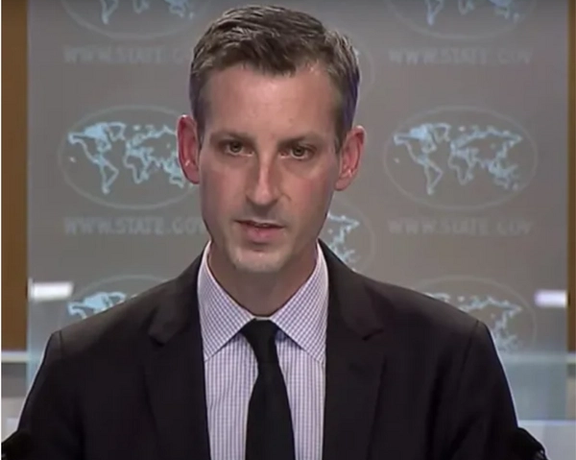
Washington expressed confidence that the Vienna talks to restore the nuclear deal with Iran can conclude quickly if the Iranians are willing to proceed in good faith.

Washington expressed confidence that the Vienna talks to restore the nuclear deal with Iran can conclude quickly if the Iranians are willing to proceed in good faith.
US State Department Spokesperson Ned Price said in his briefing on Monday that the deal can be revived if the Iranians “allow us to continue to build on and to move forward with the significant progress that had been made over months and months of oftentimes painstaking diplomacy and negotiations”.He dodged questions about whether the EU coordinator of the talks, Enrique Mora, is carrying any new message from the US, and only said, “We support his efforts to bring these negotiations to a successful conclusion. I wouldn’t want to prejudge or attempt to discern what he might hear from his Iranian counterparts.”“We will pursue a mutual return to compliance with the JCPOA as long as it’s in our national security interest to do so. Right now, it remains in our national security interest to see Iran’s nuclear program put back in a box,” he said.However, Price added the Biden administration is ready to admit the failure of the talks, saying, “We’re already at the point where we’re preparing equally for either scenario – a mutual return to compliance with the JCPOA or an alternative – and we’re discussing both with our allies and partners”.Pundits in Iran are during Mora’s visit due on Tuesday to persuade Iran to return to the nuclear talks with a positive attitude.
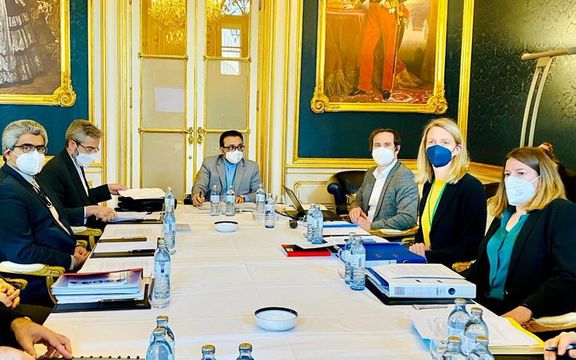
Pundits in Iran are pessimistic about the visit of EU's Enrique Mora Tuesday in a bid to persuade Iran to return to the nuclear talks with a positive attitude.
However, there was little if any sign of a positive attitude in the Iranian foreign ministry spokesman’s latest statement about the visit. Saeed Khatibzadeh said: "The United States has violated Iran's rights and has taken things from the Iranian nation's pocket which it should return."
Political analyst Ali Bigdeli told Nameh News website in Tehran on Monday that Mora's visit to Tehran is not likely to solve any problem. Bigdeli stressed that any breakthrough in the current situation of the talks needs a change of strategy and approach in Tehran.
Mora will stay in Tehran for more than one day, and this could mean that extensive talks are under way, although the Iranian foreign ministry spokesman's statement leaves very little hope for a "change of approach.” A change in Iran's strategy is even more unlikely following Supreme Leader Ali Khamenei's meeting with Syria's Bashar al-Assad in Tehran on Sunday, as the outcome of the meeting could be a bigger role for Iran in the region.
During the past weeks some Iranian observers suggested that Iran should soften its positions in Vienna as the country badly needs an agreement that would reduce the pressure of sanctions on Iran's ailing economy.
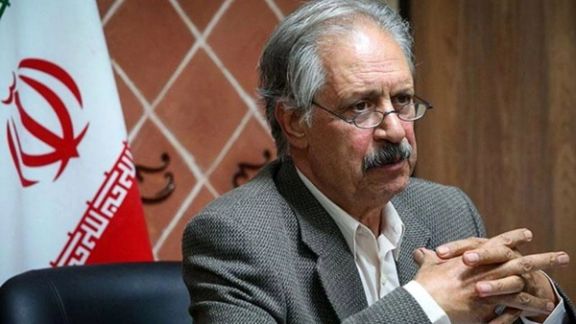
Bigdeli said Mora was not successful in his previous missions to Tehran. This is his second visit since late March. He was not successful in his first visit as the Americans rejected the idea of delisting the IRGC as a terrorist group. But he added that now Biden might need an achievement before Congressional elections in November.
Bigdeli explained that "Talk of IRGC has derailed the nuclear negotiations. Now Iran needs to change its strategy about the region and problems are unlikely to be solved unless it adopts a pacifist approach to its regional and international strategy."
He added: "Iran needs to change its ideological anti-West approach which has led to the current deadlock. This has brought Israel closer to our borders…For once we should begin to change our views about the missile program, regional issues, human rights and so on if we really want to solve our problems."
Bigdeli stressed: "We should prioritize our national interests. Without doing so, Mora's visit and similar initiatives are not going to change anything. Our current approach has led to our isolation and created all of these economic problems."
Meanwhile, another Iranian political commentator and former diplomat Jalal Sadatian has also told Nameh News that "There is not much hope in reaching an agreement in Vienna unless one or both parties make essential changes to their positions."
He said, "Iran should have allowed the previous government [Hassan Rouhani] to forge an agreement as everything was ready [last year]. But that opportunity is lost.,” and now the IRGC issue is preventing a deal, waiting for a political decision to be made in Tehran [by Khamenei]."
Sadatian added that "in the current situation the US is not in a hurry as it knows that we have problems in our country." He went on to say that Iran is now more cautious in its relations with Moscow after the war in Ukraine and is counting to some extent on building better ties with Europe. But if the talks are not conclusive, pressures inside Iran will mount to a level higher than what we see today."
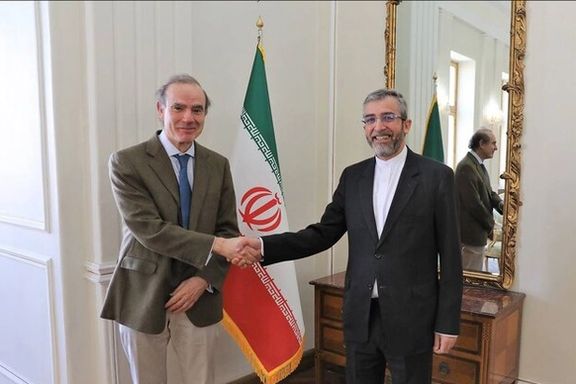
Iran's foreign ministry said Monday that the visit of a senior European diplomat this week is not expected to make a breakthrough in the stalled nuclear talks.
The EU coordinator of the talks Enrique Mora's visit does not mean that he is "coming with a new message after a pause [in Vienna talks]," spokesman of the ministry Saeed Khatibzadeh told reporters Monday at his weekly press briefing. "At the moment the agenda of Mora, the EU, and the JCPOA coordinator is only conveying messages and nothing new is expected to happen.'
The Vienna negotiations stopped in mid-March as Iran demanded the removal of its Revolutionary Guard (IRGC) for the US list of terrorist organization. The Biden administration so far has not accepted Tehran’s demand as opposition to such a concession has grown in Washington.
Khatibzadeh said the plan for the visit was proposed by the EU Foreign Policy Chief Josep Borrell his phone talk with Foreign Minister Hossein Amir-Abdollahian on April 22 and that this required in person meetings and talks in Tehran. So far, he added, the only meeting arranged for Mora in Tehran will be with Iran's top negotiator Ali Bagheri-Kani.
Calling the recent motions by the US Senate "anti-diplomacy," Khatibzadeh said Iran and the 4+1 have shown commitment to the diplomatic path and reaching "a good, reliable and lasting agreement" so it is the US that has to make a decision.
On April 4, a clear majority of Senators voted for two motions expressing their opposition to the Biden administrations negotiating approach to Iran.
The steps Iran requires the US to take to ensure its verifiable return to the 2015 nuclear deal, Joint Comprehensive Plan of Action (JCPOA) cannot be reduced to the delisting of Iran's Revolutionary Guards (IRGC), the spokesman said. "The United States must guarantee to observe all the rights that it has deprived the Iranian nation from and abide by the UN Resolution 2231."
The Biden administration has said that it will only negotiate over delisting the IRGC if Tehran agrees to negotiate over other matters such as its regional activities which are similarly outside the purview of the JCPOA.
Khatibzadeh also confirmed the visit of Qatar's Emir, Tamim bin Hamad al-Thani, to Tehran this week and said discussion of "bilateral, regional and international matters" was on the agenda of the visit. "Iran and the 4+1 are on one side of the stream and the US is on the side. There is no need for mediation between Iran and the 4+1," he said.
A source quoted by Reuters Sunday said Qatar's emir who will visit Tehran this week and then head on to Europe and the UK, will focus on mediating between Iran and European sides in the Vienna talks to bring the parties to "a new middle ground" among other things such as energy security during his trips.
Syrian President Bashar Assad visited Tehran on Sunday and received praise by Supreme Leader Ali Khamenei and promises of stronger cooperation. Although the real purpose of the unannounced visit was not clear, it could strengthen perceptions of Iran's meddling in the region, if its military role expands in Syria in the wake of Russia's entanglement in Ukraine.
The IRGC is deeply involved in Syria's decade-old civil war, seen as a serious threat by Israel, as Iranian weapons and personnel entrench themselves near Israel's borders.
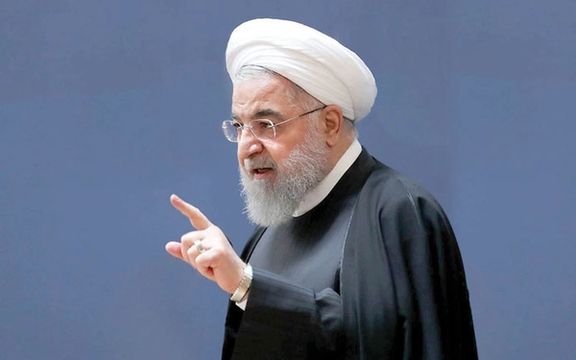
Former Iranian President Hassan Rouhani has said the revival of the nuclear deal was possible a year ago, noting that the situation has become more complicated.
Speaking to a group of his former officials on Sunday, Rouhani stressed the need for lifting economic sanctions, which is tied to restoring the 2015 nuclear agreement, officially known as the Joint Comprehensive Plan of Action (JCPOA).
He added that the administration of Ebrahim Raisi should not miss the opportunity to reach an agreement with world powers.
Talks began more than a year ago -- when Rouhani was still in office -- in Vienna to revive the JCPOA, and the negotiating sides had reportedly reached some initial agreements until Iran’s presidential elections in June when Tehran stopped the talks for five months. According to reports, about “70 to 80 percent" of the draft agreement was prepared during Rouhani’s term.
The negotiations continued under Raisi, but they seem to have reached a dead-end as they have stalled since mid-March, primarily because of Tehran’s demand to remove its Revolutionary Guard (IRGC) from a US list of terrorist organizations.
The Biden administration so far has not accepted Iran’s demand for delisting the IRGC, as more domestic pressure has emerged in Washington against such a move. Almost all Republicans and many Democrats oppose concessions to Iran.
Enrique Mora, the European Union coordinator for the talks, is scheduled to visit Tehran on Tuesday to exchange views of Tehran and Washington, in what seems to be among the last measures to resolve the remaining issues.
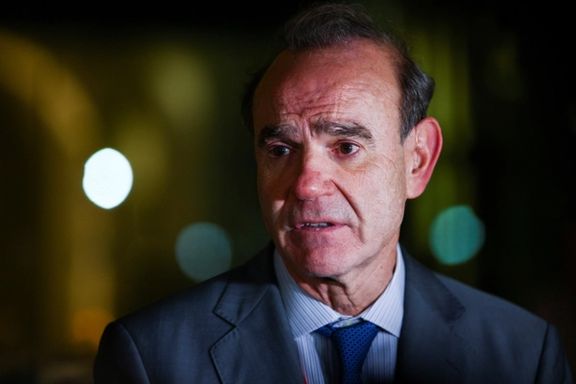
Enrique Mora, the European Union coordinator for the Iran nuclear talks, will visit Tehran on Tuesday, Nour News, close to Iran’s national security council reported Saturday.
“Considering the role of the European Union in exchange of views between Tehran and Washington, Enrique Mora’s trip to Tehran could be a new step for constructive exploration of a few remaining limited but important issues,” the website said.
Multilateral talks that began more than a year ago in Vienna to revive the 2015 Iran nuclear agreement known as JCPOA stalled in mid-March, primarily because of Tehran’s demand to remove its Revolutionary Guard (IRGC) from a US list of terrorist organizations.
Earlier on Saturday, EU foreign policy chief Josep Borrell expressed hope that Mora could visit Tehran as a last-ditch effort to salvage the talks.
The Biden administration so far has not accepted Iran’s demand for delisting the IRGC, as more domestic pressure has emerged in Washington against such a move. Almost all Republicans and many Democrats oppose any concessions to Iran.
“Although the continuation of hostile approaches by America against our country contradict the spirit of negotiations for an agreement, but the process of talks have continued,” Nour News said.
Iran is facing what appears to be unsurmountable economic problems partly triggered by US economic sanctions. Tehran this week raised flour prices, which led to unprecedented rise in the cost of bread for millions of impoverished citizens.
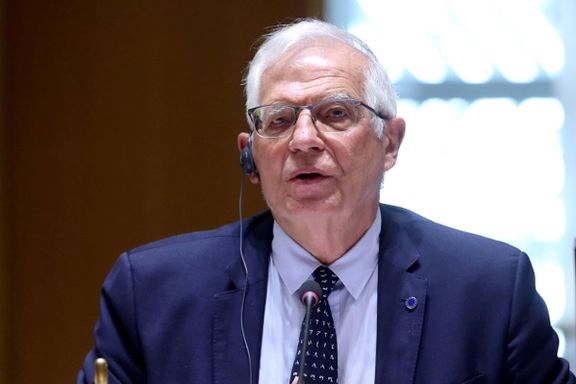
The EU foreign policy chief says he is seeking a “middle way” to end the deadlock in Vienna talks to restore the nuclear deal between Iran and world powers.
Josep Borrell told the Financial Times that the impasse threatens to jettison more than a year of European diplomatic efforts to seal the deal.
He said he wanted EU negotiator Enrique Mora to visit Tehran to discuss the remaining issues but Iran “was very much reluctant”, describing the diplomatic push as “the last bullet”.
“We cannot continue like this forever, because in the meantime Iran continues developing their nuclear program”, Borrell warned,
He reiterated the possibility of a scenario whereby the designation on Iran’s Revolutionary Guard is lifted, but other parts of the organization, which has several arms across the security apparatus and a sprawling business empire, will remain under the sanctions.
Negotiations, which started in Vienna in April 2021 to revive the Obama-era nuclear deal, JCPOA, have been on a protracted pause since March 11, as the Islamic Republic demanded removing its Revolutionary Guard (IRGC) from the US list of terrorist organizations.
Iran says the talks have not stopped but continue at a different pace through the exchange of written messages with the Americans through the European Union representative.